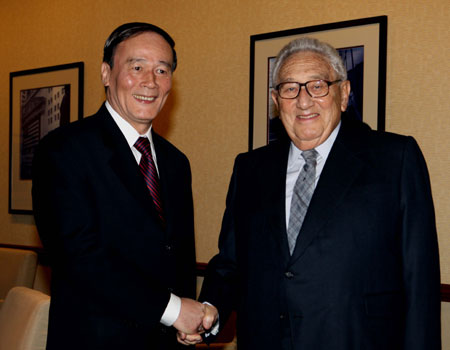Chinese Vice Premier Wang Qishan said?on Friday that China and the United States should strengthen their strategic dialogue to enhance understanding and trust and facilitate the long-term, stable and sound development of Sino-US constructive cooperation.
Establishing and developing constructive relations between Beijing and Washington is a historic inevitability, the vice premier said at a meeting with former US Secretary of State Henry Kissinger.

Chinese Vice Premier Wang Qishan (L) shakes hands with Henry Kissinger, former United States secretary of state, during their meeting in New York on June 19, 2008.
Wang praised Kissinger for his important contributions to the development of Sino-US relations.
The world cannot return to the Cold War era, because the people won't let that happen, the human race cannot tolerate another ColdWar, nor will politicians' intellect allows for it, Wang said.
Kissinger, for his part, said the overall stable development of US-China relations over the long term is a reflection of the interests of both countries.
At a time when great changes are happening in the world, the US-China relationship is an important factor in world peace and prosperity and the two sides should strengthen and expand their strategic dialogue in various fields, Kissinger said.
Wang Qishan?also met a ?leading U.S. business leader on Friday.??Harold McGraw III, chairman of Business Roundtable, an association of chief executive officers of leading U.S. companies, said that the U.S.-China Strategic Economic Dialogue has played an important role in bilateral economic and trade cooperation and that the SED should continue in a sustained and effective manner.
Harold McGraw III suggested that business leaders of the two countries should also establish and hold such dialogues as an effective complement to government- to-government dialogue.
McGraw, who is the president and CEO of the McGraw-Hill Companies, urged both governments to support such dialogues.
Wang was meeting with McGraw and leaders of other member companies of Business Roundtable to hear their opinions and suggestions about China-U.S. economic and trade relations.
Wang told the U.S. business leaders that the Chinese economy will maintain a rapid growth in a relatively long period of time and that the Chinese government will create a good environment for enterprises of both countries to conduct dialogue and mutually beneficial cooperation.
The Chinese vice premier arrived in New York on Thursday after co-chairing the 4th session of the China-U.S. Strategic Economic Dialogue in Annapolis, Maryland, and meeting U.S. President George W. Bush and U.S. lawmakers in Washington.
He said the purpose of the Strategic Economic Dialogue is to raise questions, seek consensus, and implement results, and to prevent trade protectionism and conservatism from hampering the development of bilateral economic and trade cooperation, so as to ensure that such cooperation benefits the people of both countries.
The vice premier and his entourage will depart for Beijing later Friday.
(Xinhua News Agency June 21, 2008)